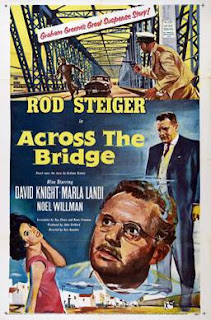As in past years, the fest offered a slate of black-and-white crime films from the '40s and '50s. Also as in past years, some of them inevitably strained the definition of noir; this year's schedule included a Sherlock Holmes movie, 1944's The Scarlet Claw, and a Western, Day of the Outlaw (1959). But so what? The definition of noir as a genre is nebulous anyway. The point is that the chance to see cool old flicks like these on a movie screen doesn't come along every day. For sheer entertainment, this may be the most reliably enjoyable film festival in the country.
Also on the schedule were such familiar entries as the John Garfield boxing drama Body and Soul (1947), Anthony Mann's outstanding and still relevant 1949 immigration thriller Border Incident, with George Murphy and Ricardo Montalban, and the hard-boiled thrillers Dead Reckoning (1947) and The Enforcer (1951), both starring noir king Humphrey Bogart. But some of us are most likely to be drawn to the relative obscurities.
This year, for instance, brought the opportunity to see No Man of Her Own (1950). In his onstage introduction to the film at the Camelot, TCM Noir Alley host Eddie Muller repeatedly referred to star Barbara Stanwyck as "the greatest actress in movie history." I'd certainly put her in the top five, anyway, and she's in fine, intense form in this adaptation of the classic Cornell Woolrich novel I Married a Dead Man (originally published under his pseudonym, William Irish).
She plays the heck out of a down-on-her-luck pregnant woman who, through circumstances generously described as coincidental, is able to pass herself off as the new daughter-in-law of a wealthy couple whose son has just died. Despite the obvious absurdities of the plot, the film is engrossing and even moving because of Stanwyck's impassioned star performance, and a fine supporting cast including John Lund, Jane Cowl, Phyllis Thaxter, Richard Denning, Milburn Stone, Carole Matthews as no-nonsense femme fatale and Lyle Bettger in a despicable turn as Stanwyck's sneering blackmailer.
The movie also had, for me, a madeleine of Proustian remembrance: Though I hadn't thought about it in years, the scene in which Stanwyck and Thaxter are upended in a train crash came back to me from childhood with the vividness of an acid flashback. I don't think I saw any of the rest of it back then, but that tidbit had been waiting in the memory banks to be revived for at least half a century.
Other gems this year included Escape in the Fog (1945), with the adorable young Nina Foch dodging Axis spies in San Francisco, and the compelling Southern thriller Woman in Hiding, from 1950.
The woman in question is Ida Lupino, who realizes she's made a major mistake marrying creepy Stephen McNally before the honeymoon even starts. Lupino's delicate beauty contrasts with her gutsy, heartfelt spirit, and director Michael Gordon manages a Hitchcock-worthy sequence set in the stairwell of a hotel. The cast includes, along with Lupino's real-life husband Howard Duff, a bit role by Joe Besser, a later-vintage replacement member of the Three Stooges.
But maybe the real oddity of the schedule was Across the Bridge (1957), a British feature based on a Graham Greene short story and starring a mannered and sweaty Rod Steiger--with a German accent, no less!--as a short-fused white-collar criminal dodging extradition in a Mexican border town. On his way south he's thrown another man, who he resembles, off the train and stolen his passport, but he ends up with this guy's soulful-faced spaniel, Delores, dogging his footsteps (sorry) and gazing reproachfully up at him.
Directed by Ken Annakin, Across the Bridge was shown in Palm Springs in a fairly crappy digital copy, but the presenter assured us that they're working to get it properly restored. I hope they succeed. It's just about the most Graham Greene-ish thing ever, full of moral limbo south of the border and Mexican women wearing prominent crucifixes. And of course it's via "Delores" (suffering) that Steiger's rotten fugitive finds a fateful sort of redemption. In terms of performance, by the way, even full-tilt Stieger is no match for the beautiful Delores, who steals the movie like a dropped potato chip.







No comments:
Post a Comment